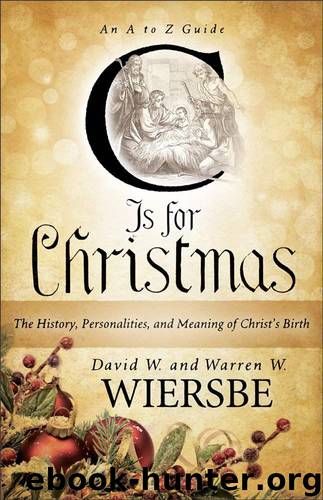C Is for Christmas: The History, Personalities, and Meaning of Christ's Birth by Warren W. Wiersbe & David W. Wiersbe

Author:Warren W. Wiersbe & David W. Wiersbe [Wiersbe, Warren W. & Wiersbe, David W.]
Language: eng
Format: epub, mobi
Tags: Religion, Holidays, Christmas & Advent, Christianity, General, Christmas—Dictionaries, Jesus Christ—Nativity—Dictionaries
ISBN: 9781441239006
Google: o2QD4FstFJIC
Amazon: B008FZ3URW
Publisher: Baker Books
Published: 2012-09-30T22:00:00+00:00
John the Baptist
Most of the season of Advent centers on the infant Jesus. The person of John the Baptist forces us to make a leap forward in time, to when Jesus is an adult. This may seem like an anachronism but it is not. At Christ’s birth, the world was prepared culturally and politically. But before the Messiah could accomplish His work of salvation, Israel had to be prepared spiritually. This was the mission of John the Baptist, and Advent is a fitting time to emphasize his work.
John the Baptizer is a “saint” of the Advent season. Each year he appears in the Gospel readings on the second and third Sundays of Advent. We learn about his background, we hear snatches of his preaching, and we know he demanded repentance. John baptized publicly those who confessed their sins (Matt. 3:6; Mark 1:4; Luke 3:3). This was unusual—and attention getting—because the Jews did not practice baptism (only Gentiles who converted to Judaism experienced a kind of washing). John the Baptist takes the stage briefly during Advent and then disappears. We need to know more about this colorful figure!
John’s mission in life was to point to Jesus. He was a witness to the light (John 1:7–8). From events before his birth to the circumstances of his death, John’s life was shaped by his relationship to Jesus. This should be true for every person who is a follower of Jesus.
John grew up knowing the story of the angel Gabriel’s conversation with his father in the temple (Luke 1:5–25). He knew that his birth was against the odds, his parents being well on in years, and he knew that his name had been given by the angel (v. 13). From his earliest days John realized that he was chosen for a special role in God’s program—he was to be the forerunner to the Messiah (vv. 17, 76). As John learned the Scriptures for himself, he understood that certain passages applied specifically to him (Isa. 40:3–5; Mal. 4:5–6). After reaching adulthood, John chose to live in the desert (Luke 1:80). Like the prophet Elijah, John the Baptist seemed to appear out of nowhere when his public ministry began.
Since Mary and Elizabeth were relatives (v. 36), some Bible scholars speculate that Jesus and John were cousins (second? third?). John was older than Jesus by several months, and perhaps they saw each other occasionally as they grew up. It seems that John did not know Jesus was the Messiah until he baptized Jesus (John 1:31). John treated Jesus with the highest respect, acknowledging he wasn’t worthy to untie Jesus’ sandals, and insisting Jesus was the greater person (Matt. 3:11; Mark 1:7–8; Luke 3:16; John 1:26–27, 33).
Luke introduces John to his readers with beautiful irony:
In the fifteenth year of the reign of Tiberius Caesar—when Pontius Pilate was governor of Judea, Herod tetrarch of Galilee, his brother Philip tetrarch of Iturea and Traconitis, and Lysanias tetrarch of Abilene—during the high priesthood of Annas and Caiaphas, the word of God came to John son of Zechariah in the desert.
Download
C Is for Christmas: The History, Personalities, and Meaning of Christ's Birth by Warren W. Wiersbe & David W. Wiersbe.mobi
This site does not store any files on its server. We only index and link to content provided by other sites. Please contact the content providers to delete copyright contents if any and email us, we'll remove relevant links or contents immediately.
| Christmas | Easter & Lent |
The 5 Love Languages: The Secret to Love That Lasts by Gary Chapman(8564)
The Space Between by Michelle L. Teichman(6113)
Assassin’s Fate by Robin Hobb(5270)
Wiseguy by Nicholas Pileggi(4626)
Everything Happens for a Reason by Kate Bowler(4080)
Gerald's Game by Stephen King(3943)
A Simplified Life by Emily Ley(3590)
The Power of Positive Thinking by Norman Vincent Peale(3470)
Pillow Thoughts by Courtney Peppernell(3443)
Resisting Happiness by Matthew Kelly(2898)
Girl, Wash Your Face by Rachel Hollis(2833)
Being Aware of Being Aware by Rupert Spira(2721)
Name Book, The: Over 10,000 Names--Their Meanings, Origins, and Spiritual Significance by Astoria Dorothy(2505)
Real Sex by Lauren F. Winner(2496)
More Language of Letting Go: 366 New Daily Meditations by Melody Beattie(2463)
The Holy Spirit by Billy Graham(2441)
Fast Facts on Defending Your Faith by John Ankerberg & John Weldon(2401)
Victory over the Darkness by Neil T. Anderson(2398)
The Secret Power of Speaking God's Word by Joyce Meyer(2268)
